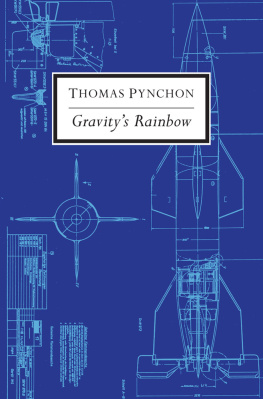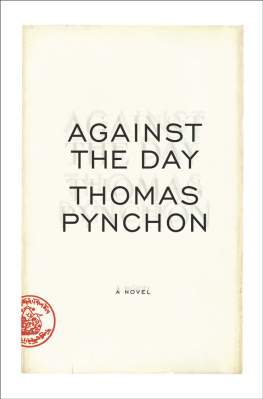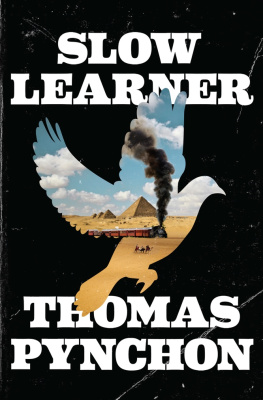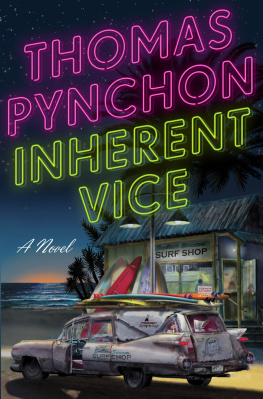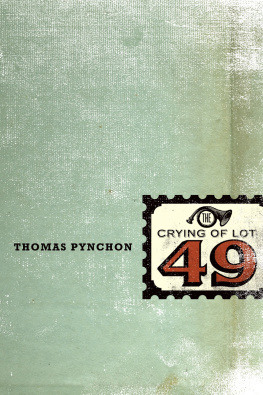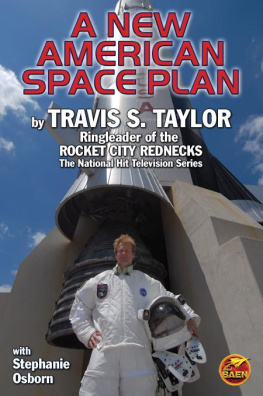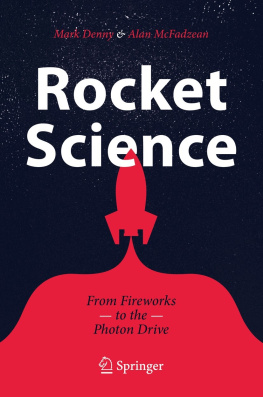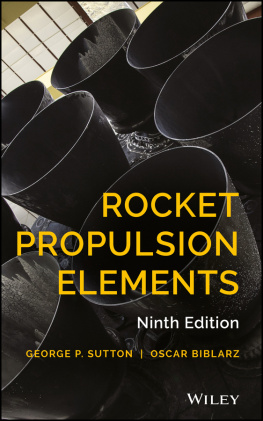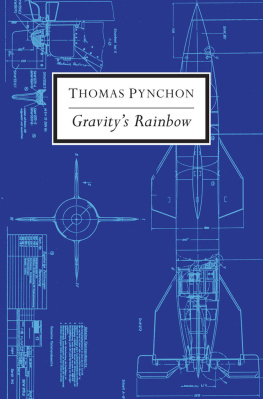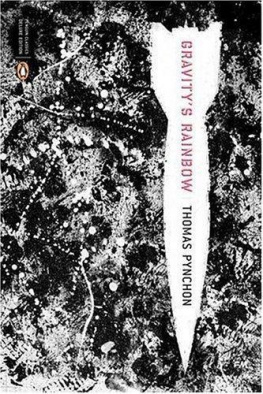Contents
Thomas Pynchon
Gravitys Rainbow
The Penguin Press
New York
2012
THE PENGUIN PRESS
Published by the Penguin Group
Penguin Group (USA) Inc., 375 Hudson Street, New York, New York 10014, U.S.A.
Penguin Group (Canada), 90 Eglinton Avenue East, Suite 700, Toronto, Ontario, Canada M4P 2Y3 (a division of Pearson Penguin Canada Inc.)
Penguin Books Ltd, 80 Strand, London WC2R 0RL, England
Penguin Ireland, 25 St. Stephens Green, Dublin 2, Ireland (a division of Penguin Books Ltd)
Penguin Books Australia Ltd, 250 Camberwell Road, Camberwell, Victoria 3124, Australia (a division of Pearson Australia Group Pty Ltd)
Penguin Books India Pvt Ltd, 11 Community Centre, Panchsheel Park, New Delhi 110 017, India
Penguin Group (NZ), 67 Apollo Drive, Rosedale, Auckland 0632, New Zealand (a division of Pearson New Zealand Ltd)
Penguin Books (South Africa) (Pty) Ltd, 24 Sturdee Avenue, Rosebank, Johannesburg 2196, South Africa
Penguin Books Ltd, Registered Offices:
80 Strand, London WC2R 0RL, England
This edition published in 2012 by The Penguin Press,
a member of Penguin Group (USA) Inc.
Copyright Thomas Pynchon, 1973
All rights reserved
Originally published by The Viking Press, 1973
Acknowledgments
Harvard University Press: Reprinted by permission of the publishers and the Trustees of Amherst College from Thomas H. Johnson, Editor, The Poems of Emily Dickinson. Cambridge, Mass.: The Belknap Press of Harvard University Press. Copyright 1951, 1955, by The President and Fellows of Harvard College. Little, Brown and Company: From Because I Coluld Not Stop for Death from The Complete Poems of Emily Dickinson edited by Thomas H. Johnson. W. W. Norton & Company, Inc., and Insel Verlag: From Duino Elegies and Sonnets to Orpheus by Rainer Maria Rilke.
Publishers Note
This is a work of fiction. Names, characters, places, and incidents either are the product of the authors imagination or are used fictitiously, and any resemblance to actual persons, living or dead, business establishments, events, or locales is entirely coincidental.
ISBN 978-1-101-59465-0
No part of this book may be reproduced, scanned, or distributed in any printed or electronic form without permission. Please do not participate in or encourage piracy of copyrighted materials in violation of the authors rights. Purchase only authorized editions.
For Richard Faria
Beyond the Zero
Nature does not know extinction; all it knows is transformation. Everything science has taught me, and continues to teach me, strengthens my belief in the continuity of our spiritual existence after death.
W ERNHER VON B RAUN
A SCREAMING COMES ACROSS THE SKY . It has happened before, but there is nothing to compare it to now.
It is too late. The Evacuation still proceeds, but its all theatre. There are no lights inside the cars. No light anywhere. Above him lift girders old as an iron queen, and glass somewhere far above that would let the light of day through. But its night. Hes afraid of the way the glass will fallsoonit will be a spectacle: the fall of a crystal palace. But coming down in total blackout, without one glint of light, only great invisible crashing.
Inside the carriage, which is built on several levels, he sits in velveteen darkness, with nothing to smoke, feeling metal nearer and farther rub and connect, steam escaping in puffs, a vibration in the carriages frame, a poising, an uneasiness, all the others pressed in around, feeble ones, second sheep, all out of luck and time: drunks, old veterans still in shock from ordnance 20 years obsolete, hustlers in city clothes, derelicts, exhausted women with more children than it seems could belong to anyone, stacked about among the rest of the things to be carried out to salvation. Only the nearer faces are visible at all, and at that only as half-silvered images in a view finder, green-stained VIP faces remembered behind bulletproof windows speeding through the city....
They have begun to move. They pass in line, out of the main station, out of downtown, and begin pushing into older and more desolate parts of the city. Is this the way out? Faces turn to the windows, but no one dares ask, not out loud. Rain comes down. No, this is not a disentanglement from, but a progressive knotting intothey go in under archways, secret entrances of rotted concrete that only looked like loops of an underpass... certain trestles of blackened wood have moved slowly by overhead, and the smells begun of coal from days far to the past, smells of naphtha winters, of Sundays when no traffic came through, of the coral-like and mysteriously vital growth, around the blind curves and out the lonely spurs, a sour smell of rolling-stock absence, of maturing rust, developing through those emptying days brilliant and deep, especially at dawn, with blue shadows to seal its passage, to try to bring events to Absolute Zero... and it is poorer the deeper they go... ruinous secret cities of poor, places whose names he has never heard... the walls break down, the roofs get fewer and so do the chances for light. The road, which ought to be opening out into a broader highway, instead has been getting narrower, more broken, cornering tighter and tighter until all at once, much too soon, they are under the final arch: brakes grab and spring terribly. It is a judgment from which there is no appeal.
The caravan has halted. It is the end of the line. All the evacuees are ordered out. They move slowly, but without resistance. Those marshaling them wear cockades the color of lead, and do not speak. It is some vast, very old and dark hotel, an iron extension of the track and switchery by which they have come here.... Globular lights, painted a dark green, hang from under the fancy iron eaves, unlit for centuries... the crowd moves without murmurs or coughing down corridors straight and functional as warehouse aisles... velvet black surfaces contain the movement: the smell is of old wood, of remote wings empty all this time just reopened to accommodate the rush of souls, of cold plaster where all the rats have died, only their ghosts, still as cave-painting, fixed stubborn and luminous in the walls... the evacuees are taken in lots, by elevatora moving wood scaffold open on all sides, hoisted by old tarry ropes and cast-iron pulleys whose spokes are shaped like Ss. At each brown floor, passengers move on and off... thousands of these hushed rooms without light....
Some wait alone, some share their invisible rooms with others. Invisible, yes, what do the furnishings matter, at this stage of things? Underfoot crunches the oldest of city dirt, last crystallizations of all the city had denied, threatened, lied to its children. Each has been hearing a voice, one he thought was talking only to him, say, You didnt really believe youd be saved. Come, we all know who we are by now. No one was ever going to take the trouble to save you, old fellow....
There is no way out. Lie and wait, lie still and be quiet. Screaming holds across the sky. When it comes, will it come in darkness, or will it bring its own light? Will the light come before or after?
But it is already light. How long has it been light? All this while, light has come percolating in, along with the cold morning air flowing now across his nipples: it has begun to reveal an assortment of drunken wastrels, some in uniform and some not, clutching empty or near-empty bottles, here draped over a chair, there huddled into a cold fireplace, or sprawled on various divans, un-Hoovered rugs and chaise longues down the different levels of the enormous room, snoring and wheezing at many rhythms, in self-renewing chorus, as London light, winter and elastic light, grows between the faces of the mullioned windows, grows among the strata of last nights smoke still hung, fading, from the waxed beams of the ceiling. All these horizontal here, these comrades in arms, look just as rosy as a bunch of Dutch peasants dreaming of their certain resurrection in the next few minutes.

